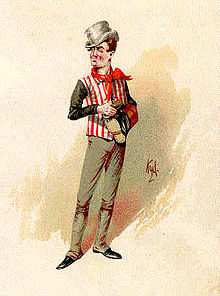| Sam Weller | |
|---|---|
| The Pickwick Papers character | |
 Sam Weller by 'Kyd' | |
| Created by | Charles Dickens |
| In-universe information | |
| Gender | Male |
| Occupation | Shoeshiner |
| Family | Tony Weller (father) |
| Nationality | English |
Sam Weller is a fictional character in The Pickwick Papers (1836), the first novel by Charles Dickens, and the character that made Dickens famous. [1] [2] A humorous Cockney bootblack, [3] Sam Weller first appeared in the fourth serialised episode. [2] Previously the monthly parts of the book had been doing badly, selling only about 1,000 copies a month — but the humour of the character transformed the book into a publishing phenomenon, raising the sales by late autumn of 1837 to 40,000 a month. [4]
Contents
On the impact of the character, The Paris Review stated, "arguably the most historic bump in English publishing is the Sam Weller Bump." [1] Such was the popularity of the character that William Thomas Moncrieff named his 1837 burletta Samuel Weller, or, The Pickwickians after the main comic character in the novel, rather than on Samuel Pickwick himself. [5] [6] [7] Merchandise based on the character appeared, such as Sam Weller puzzles, Weller boot polish and Weller joke books. [1]




